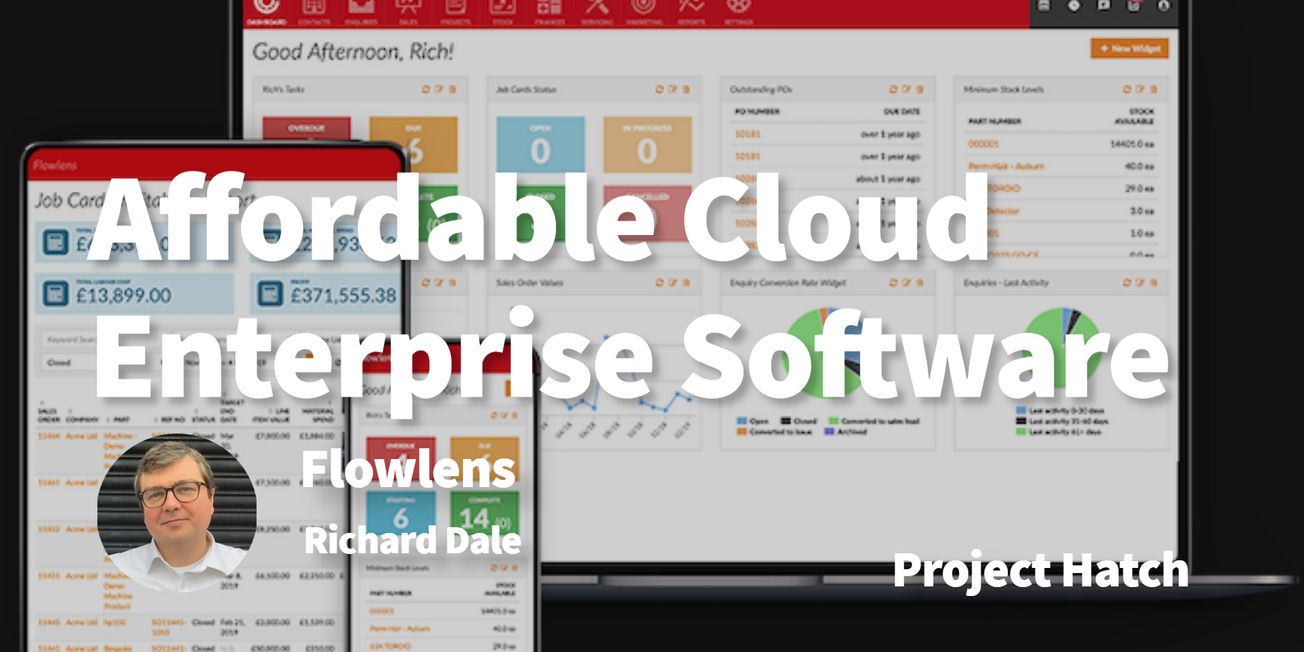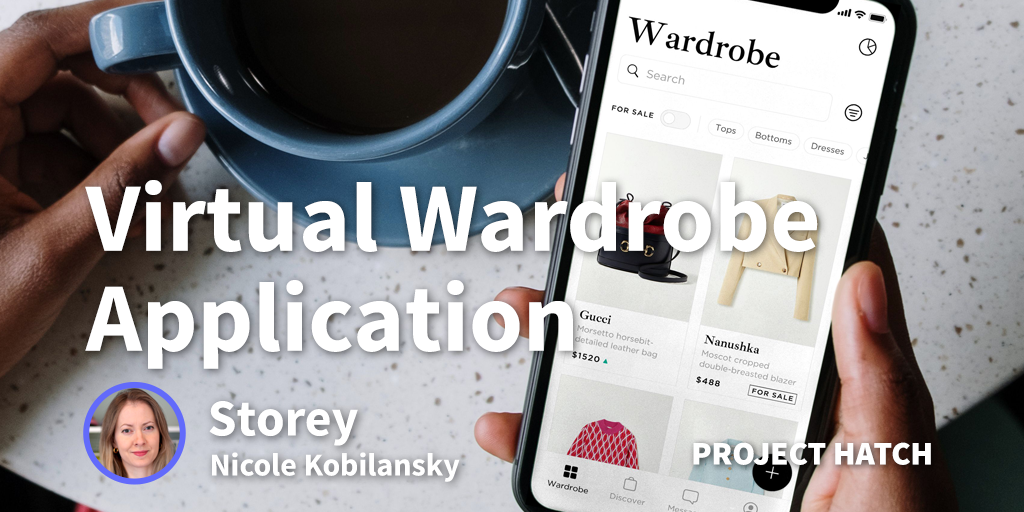Flowlens provides powerful but affordable manufacturing business tools to small equipment and machinery manufacturers, including CRM, MRP and Service software, all in one system. Flowlens enables manufacturers to dramatically improve the way they manage their business, and helps them avoid the common problems that most manufacturers face.
Flowlens is the result of about 15 years consulting and custom development experience working with a variety of businesses, all of whom suffered from badly disjointed business processes. These resulted in needless admin for staff, lots of duplication of efforts, errors and communications problems, all of which made for poor customer experience and higher costs.
I built my first website back in 1997, and quickly realised the power of web based technology to offer new kinds of customer experiences and processes. Being based in Northern Ireland, the web revolution hadn’t really started, but over the first few years I was lucky enough to work with several clients early on who thought the same way. What was exciting was the differentiating factor: none of their competitors saw them coming, and it was satisfying to help make this difference.
What was important too was how we approached the business process. Most businesses think in ‘silos’ - sales, operations, finance etc. I’ve always taken a holistic view of the business. Some call it the ‘value chain’ and this is a great way for people across a business to understand how they contribute to the ultimate goal of a satisfied, profitable customer.
I applied this approach to a number of projects, from IT resellers, finance companies and manufacturing business. Seeing the efficiencies and customer outcomes was great, but the truly satisfying part was helping clients see things in a different, more joined up light. People realised the impact their actions (or inactions) had on the people around them. Silo thinking gave way to the value chain and improved, more customer-centric collaboration across functions.
By the early 2010s, cloud tech was more flexible, and it was a good time to think about building a product. Our first attempt, a templated planning tool, was a huge learning curve, but ultimately suffered because the consulting service customers always came first. We learned lots about finding product / market fit (or not), identifying a market that was big enough and could pay (or not), and also about streamlining our own procedures around customer onboarding and retention.
Meanwhile, we worked with several equipment manufacturing businesses on the consulting and development projects, helping streamline and connect business processes with custom built cloud software. It was at this point that the original idea for the Flowlens software emerged. We could see how smaller manufacturing businesses simply couldn’t afford the kind of ‘enterprise’ software tools that existed at the time. And, even if they did have deep enough pockets, the time and expertise needed to make significant IT changes happen was hard to find.
What problem do you solve for customers?
We could see that small equipment manufacturers suffered from three big headaches in their day to day operations.
First was basic clarity in communication between the front-end sales, and back-end manufacturing function. Clarity of what was in the sales pipeline, what was likely to convert, what had actually been ordered, and when was it needed. Small manufacturing companies are like many other small businesses. Information tends to be in peoples’ heads, stuck in emails, paper or numerous spreadsheets. This meant long hours just to stay on top of things, and typically reactionary tactics to deal with orders dropping out of nowhere, and, trying to ensure that the specification of the product ordered is correct before it goes into production.
The second big issue was simply resource: having got an order – do we have the resources necessary to manufacturer? Again this required laborious efforts to stay on top of stock levels and availability of people, current jobs etc. Even a basic component could delay delivery of a product, keeping cash tied for longer than necessary.
A third headache, which was/is more of an opportunity for small machinery manufacturers is Service. In most cases, after-sales service is an after-thought.
When customers need spare parts, or a machine breaks down, the Manufacturer can react. This is fine, but it is leaving a lot of money and goodwill on the table. Service is a different kind of business model, so it's natural that manufacturers will focus on the next thing to be made. However we could see that forward thinking businesses could be proactive in their service efforts, and actually address customer anxieties about preventing equipment failure and ensuring appropriate backup was in place.
So, we thought, let's build a cloud manufacturing CRM and MRP software solution, including Asset Service Management features, that can satisfy the needs of small manufacturing companies out there.
And that’s what we have done.
How did you get your early customers, and what did you learn in the process?
Based on our existing client credentials, we were able to open doors with other local manufacturers and present the concept and demonstrate an early version of the product. The feedback was positive, and we were able to recruit several early customers who got onboard.
It became clear that we needed to manage our product decisions carefully, and in the early days this was one of the hardest lessons learned. When you are a service company, building one-off solutions, you don’t need to compromise on feature decisions, the customer gets what they need. With a product, you are trying to make the right decisions to satisfy all the early customers, and those who come down the line.
Culturally, as a service business, we were so used to saying ‘yes’ to (valid) client requirements, so this was something we really struggled with in the early days. It took time to develop a thick skin to say no, but also the science and intuition necessary to make decisions about features.
In all cases, we were trying to take a requirement, cross reference with others, and then device a solution that was as flexible as possible. In particular we built configuration tools that users could manage themselves, and handle different scenarios. In some cases, we didn’t make the right call.
The hardest, but one of the most rewarding lessons learned in the Flowlens journey has been about positioning and product-market fit. It is liberating to ‘know who you are for’ and who you are not. Unfortunately, part of the journey also means parting with those who are not a good fit.
Do you have any advice for someone just starting out?
For people just starting out in product, particularly those software service businesses tempted to build a product, this can be the hardest thing to get your head around. There are tons of great ideas out there, insights gained through real-world interaction with clients. But do these translate into a fully formed product, with a market big enough, a price-point and customer acquisition and retention process that enable profits to made in the end-up?
Early sales prospects have a habit of saying, ‘i’d buy it today, if it just had this one extra feature…’ and it can be frustrating to say the least, but such requests are endless.
I’m often asked for advice from companies in this position. My advice is always the same. Before you write a line of code, take the outcome you plan to offer your market, map out the value stream, and figure out who to do it manually. (That might be google docs, form, email, carrier pigeon, whatever, the customer doesn’t need to know.) And then find 3 customers and deliver the value to them using your new process. You’ll find out pretty quickly if this is a business opportunity, a nice to have feature, or a pipe dream.
We had the benefit of years of existing customer experience to feed into our early versions of Flowlens, but that didn’t mean we got it all right. We bootstrapped the first couple of years of Flowlens, whilst still continuing development services. We were determined to learn as much as possible, before taking the step into the investment world. A step we knew would be necessary to accelerate the R&D and market reach needed to take Flowlens to the wider stage. We have been lucky to work with the very supportive team at Crescent Capital, based in here Belfast, to help us make our vision reality.
Growth
The tactics you need to get your first 3 users will be different from the next 10, 50, 100 and so on. This perhaps was the biggest culture shock for our business. As a 10-person team, with solid long-term clients and highly regarded reputation, we rarely wanted for new business.
We took the leap to rebrand the business in 2014, as the original trading name (Crafty Devil) and the new Flowlens product name felt incompatible. This was taken deliberately as we didn’t have the resources to back both horses, and we knew Flowlens was our future.
Looking back now, with 100s of paying users, our early business development activities are night and day from the approach we take now. We are laser-focused on recruiting the right kind of manufacturers to use Flowlens cloud MRP and CRM software, businesses that we know we can help, and who will grow as we grow.
How do you differentiate yourself from competition?
Small businesses are typically fraught. There are never enough hours in the day. And a lot of the hours we do have are spent fending off unsolicited marketing and sales messages for the many products and services we might consider to help us run our business. So how does Flowlens cut through the noise?
Ideal Customer Profile
This might seem obvious, but a lot of businesses don’t clearly define who they are looking for, others are brilliant at it. As we became more disciplined in the definition and application of our own Ideal Customer Profile, conversation about product, marketing, sales and onboarding became easier.
It also makes it easier to find the right kind of businesses and people to target. There are many different kinds of businesses, but we are primarily interested in those who assemble and supply machinery, plant, or equipment of some kind. Owners and senior managers in these companies are time poor, they don’t go to many trade shows, and given the wide range of sectors they operate in, there are a myriad of trade publications you could spend money on, and probably never see a return.
Instead we now focus on using LinkedIn and opt-in email lists to interact with senior people who work for small companies. We target them directly, and we supplement that with helpful content that deals with problems they experience day to day. We also use testimonials from existing customers, not just to talk about the positive experience they’ve had using Flowlens, but also about their digital transformation journey. We use Autopilot to nurture those who aren’t ready to take the plunge.
Ultimately small business owners are only going to buy a product that they truly believe will make their life easier. The risks of failure are too great to ignore, and seeing others who’ve successfully made the transition puts their mind at ease.
As our user base has grown, we’ve developed referenceable clusters of small manufacturing companies using our software in sectors such as agricultural machinery, electrical engineering and energy management. We use social media and paid content to target people in these sectors, and demonstrate our credentials.
Larger MRP/ERP/CRM providers profess to serve a range of sectors, and in some cases this works well. If we were trying to target different businesses types, we’d simply fail.
And this is the critical learning for any agency (or anyone for that matter) wanting to wade into the competitive world of B2B SaaS.
Focus.
Without it, you’ll get tossed around in a sea of hope, false promises and half baked features. You’ll burn out. And cash out. Focus on one customer group and solve their problem better than anyone else, and you can thrive.
| Company Name: | Flowlens |
|---|---|
| Founder: | Richard Dale |






